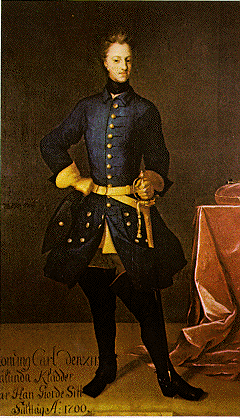
Karl XII / Charles XII of Sweden

King of Sweden from 1697 to 1718.
David Allen
Biographical Entry
 Charles XII reigned as king of Sweden from 1697-1718. He was nearly fifteen years old when he ascended to absolute royal power and eighteen when neighbors attacked the Swedish Empire at the outset of the twenty-one year Great Northern War. He left his capital of Stockholm in 1700 to personally lead his army and never returned. He would rule from the field the remaining eighteen years of his life. Sweden lost this struggle against the amorphous coalition of European powers great and small led by Peter the Great of Russia.
Charles XII reigned as king of Sweden from 1697-1718. He was nearly fifteen years old when he ascended to absolute royal power and eighteen when neighbors attacked the Swedish Empire at the outset of the twenty-one year Great Northern War. He left his capital of Stockholm in 1700 to personally lead his army and never returned. He would rule from the field the remaining eighteen years of his life. Sweden lost this struggle against the amorphous coalition of European powers great and small led by Peter the Great of Russia. The results were the end of any serious Swedish Imperial pretensions and the birth of the Russian Empire as a European great power.
The results were the end of any serious Swedish Imperial pretensions and the birth of the Russian Empire as a European great power.
The Swedish Empire in 1700 was much greater than we would likely imagine today for two reasons. It was large, comprehending most of the Baltic shore from the Gulf of Bothnia to the Danish Peninsula including what is today Sweden, Finland, Russian Karelia and Ingria, Estonia, Latvia, and the much of the German Baltic coast. Secondly, it was superbly organized for defense, capable of mobilizing an army of well trained, drilled and led natives for its own defense and providing a navy adequate for trade and combat in defense of Sweden's Baltic interests.
Charles XII's reign began peacefully and for roughly three years stayed peaceful. He earned a reputation as something of a childish monarch among his peers. He spent time bear hunting and attending balls and celebrations for his sister's wedding to the Duke of Holstein. His neighbors in Denmark, Poland and Russia inspired by a disgruntled Swedish subject named Patkul, reasoned they could take advantage of a playful boy and regain from Sweden what had been lost to her in the previous hundred years and more.
In 1700, King Frederick of Denmark, King Augustus of Poland (Elector of Saxony) and Czar Peter of Russia acted in alliance to dismember Sweden. Frederick attacked Holstein, the duchy allied to Sweden by marriage; Augustus attacked Riga acting as Elector and not King. Russia lay siege to the Swedish garrison at Narva on the Gulf of Finland. Charles XII mobilized Sweden for war, called on the treaty obligations of England and Holland and dispatched Denmark in six weeks. He then shifted the Swedish army to Pernau in present day Estonia and upon hearing of the Saxon withdrawal from the gates of Riga flew directly at the Russian army outside of Narva. Despite winter conditions and a near total lack of provisions the Swedes force marched from Pernau and arrived before Narva in three days. With eight thousand effectives they destroyed the Russian army. Sources disagree on the size disparity between the two armies but all agree the victory was a stunning blow to Russia when none was expected.
The years 1701-1707 would see a complex series of diplomatic and military initiatives and actions both in Poland and in the Swedish territories along the Gulf of Finland. The Russians would gradually grind down Swedish resistance along the Gulf while Peter simultaneously saw to the construction of his new capital of St. Petersburg on Swedish soil. Charles and the principle Swedish forces would force Poland to name a Swedish candidate King in Poland and depose Augustus. There was no time in this period that an enemy stood before an attack by forces under the personal command of Charles XII regardless whether that force stood in larger numbers or better position.
In 1707 Charles XII marched east toward Russia with the largest army he ever commanded. He had as much as feasible permanently removed both Denmark and Saxony-Poland from his list of enemies. The Russian forces before him burned anything that could have been of sustenance to the Swedes. The weather was abnormally wet and progress for the army under Charles and the supply column coming from Riga behind him was slow. Finally, with the assurances of the Cossack Hetman Mazepa Charles turned south into Ukraine in search of supplies and reinforcement. Word of the Cossack's defection reached the Czar first however and Mazepa's forces were crippled and his supplies destroyed before the Swedes arrival. Also, in turning south the supply column from Riga was exposed to attack and destroyed.
1709 opened with the Swedish army desperately trying to survive the harshest winter on record in the unforgiving Ukraine. The loss of life to exposure was brutally high. Still, Charles sought decisive battle with the Russian forces and finally precipitated one outside the Russian garrison of Poltava in July. Due to a wound in his foot received by a sniper bullet days before the battle and the temporary coma that blood loss and fever had induced, Charles was unable to personally command the army at Poltava. Command broke down during the battle and the Swedes were swept from the field. In the following days Charles and a band of followers escaped to Ottoman Turkey while the bulk of Poltava's Swedish survivors surrendered to the Russians. Charles remained in Turkey for five years trying with some success to convince the Sultan to attack Russia. In 1710 Peter invaded Turkey and found himself surrounded by an overwhelming Turkish force, yet managed to bargain his way out of the trap and escape. This was as close as Charles XII came to reversing the result of Poltava. Throughout his stay in the Ottoman territories Charles would live off the largess of the Sultan and eventually overstay his welcome. The Janissaries detailed to guard him were ordered to seize the Swedish King and only succeeded after a pitched fight of a handful of Swedes pitted against thousands of Janissaries reluctant to hurt the King. This was the Kalabalik at Bender. When even Charles could find no further reason for staying in Turkey and was released by the Porte he rode from Adrianople to Stralsund in Pomerania with two attendants arriving in the middle of the night.
Charles returned to a destitute Sweden. Its navy was all but gone. Its army lost in fourteen continuous years of campaigning and nearly all but Sweden proper under foreign control. Prussia, Hanover, Denmark, Saxony, Poland, and England had joined Russia. There had been bad harvests and several years of the plague. In the final years of the reign Charles raised yet another army for the invasion of Norway (then a part of Denmark) and during the second invasion of that country was shot through the head before the small fortress of Frederiksten (at Halden in Norway). He died on the spot. The Swedish King was 36 years old.
The most recent and scientific evidence reports he was assassinated, though this is a long-standing controversy with at times assassination and at other times the 'honest enemy bullet' gaining the upper hand over nearly three hundred years.
Charles XII was proverbial in his day for never having alcohol or women. He also had a nearly supernatural willpower. He barely registered physical pain. Despite years of devastating disappointments he only allowed himself an expression of sorrow when his eldest sister died. He was brave and fatalistic to a suicidal degree.
When he is remembered today it is for invading Russia and failing to foil the nation building designs of Peter the Great. Nationalism and even xenophobia have been projected on him as he has been adopted by the far right in Sweden. In military circles, he was the principle inspiration of "cold steel" tactics. His disciples argued the value of charging any enemy with elan, bayonet and sword as the true road to victory in battle. This legacy would last until the First World War. He remains an inspiration to poets and authors of fiction as a man who transcended normal limits.
Literature on Charles XII
For the finest scholarly treatment of his life in English see: R. M. Hatton: Charles XII. For the most renowned biography see: Voltaire: History of Charles XII, King of Sweden. For poetry see Samuel Johnson: Vanity of Human Wishes or Lord Byron: Mazeppa. For fiction see: E. M. Almedingen: The Lion of the North: Charles XII King of Sweden.
 Charles XII reigned as king of Sweden from 1697-1718. He was nearly fifteen years old when he ascended to absolute royal power and eighteen when neighbors attacked the Swedish Empire at the outset of the twenty-one year Great Northern War. He left his capital of Stockholm in 1700 to personally lead his army and never returned. He would rule from the field the remaining eighteen years of his life. Sweden lost this struggle against the amorphous coalition of European powers great and small led by Peter the Great of Russia.
Charles XII reigned as king of Sweden from 1697-1718. He was nearly fifteen years old when he ascended to absolute royal power and eighteen when neighbors attacked the Swedish Empire at the outset of the twenty-one year Great Northern War. He left his capital of Stockholm in 1700 to personally lead his army and never returned. He would rule from the field the remaining eighteen years of his life. Sweden lost this struggle against the amorphous coalition of European powers great and small led by Peter the Great of Russia.